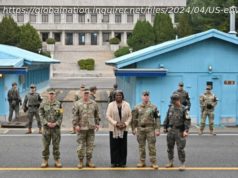What we’ve got here is a failure to communicate.
There are a number of structural impediments to achieving “complete and irreversible denuclearization of North Korea,» the stated policy goal of the United States and her allies. The North Korean regime—while it may in fact be committed, at some level, to economic liberalization—has every reason for keeping its weaponry: defensively, because the Kims have (probably rightly) determined that only nuclear weapons will ensure their survival. And offensively too, because the regime is ideologically committed to absorbing South Korea one day. Nuclear weapons are an important part of the strategy for achieving that long-held goal, too. And then there’s the matter of verification. Even if North Korea commits rhetorically to denuclearizing, the Kim regime controls a vast, mountainous, poorly understood land. It wouldn’t be that hard to obscure parts of a still extant program.
But there’s another reason, too, for the apparent breakdown of talks between Secretary of State Mike Pompeo and his North Korean counterpart. North Korea claims that Pompeo, during his third visit this year to Pyongyang, made a “unilateral and gangster-like demand for denuclearization.” The talks between North Korea and the U. S. are apparently in real trouble.
The current contretemps appears to be linguistic in nature. Fundamentally, it’s a dispute over what the meaning of “denuclearization” is.
When the U. S. administration envisages a denuclearized North Korea, it doesn’t foresee restricting its own security system in East Asia. North Korea would give up its weapons, yes, but at least some American troops would remain in Japan, and, crucially, South Korea, too. Those two allies would remain under America’s nuclear umbrella—they wouldn’t need to arm themselves for protection, but rather could rely on the U. S. presence in the region to guard against Chinese and North Korean (non-nuclear) aggression.
Pyongyang, on other hand, sees “complete denuclearization» as including the withdrawal of the U. S. security umbrella from the South. That’s why the word “unilateral” in North Korea’s temper tantrum is key. The U. S. does not have nuclear weapons deployed in South Korea, but North Korea regards as the U. S. presence there—and the implied security umbrella—as not much different. North Korea, if it does in fact agree to denuclearize, will only do so if the U. S. steps back to its long-time ally south of the DMZ. It can’t be unilateral.
In other words, «complete denuclearization» means different things to each party. What we’ve got here is a failure to communicate.






